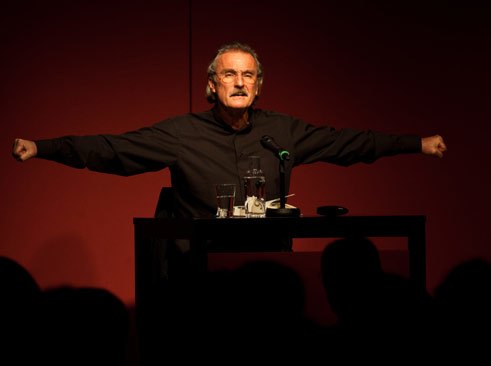Readings
Mediating literature in event form

The author’s voice: Christoph Ransmayr reads. | © Literaturhaus München/Juliana Krohn
The reading is a typically German way of mediating literature. Its popularity remains undiminished – and it demands of authors a great deal more than narrative and stylistic skills.
“And you’ve all come voluntarily and actually paid for the privilege?” Jonathan Safran Foer was impressed as he sat down in front of an audience of more than 300 people at Munich’s Literaturhaus (House of Literature) to read from his debut novel Everything Is Illuminated. In fact, the reading is a very German way of mediating literature that is rarely encountered elsewhere.
Institutional diversity
A look at the different venues and institutions is enough to show how varied Germany’s readings landscape is today. When their new book is published, authors go on tour. They make appearances in bookshops, libraries and theatres. They are guests at the major book fairs in Frankfurt and Leipzig and then move on to the houses of literature – another intrinsically German institution – that have existed since 1986 in many German cities. The events organised by these professional institutions at municipal level are taken up elsewhere by literary clubs and societies. And then there are around 50 literature festivals – from the small, select Literature Days in Freiburg to major festivals featuring over 100 international authors, such as the International Literature Festival Berlin. All this has changed and broadened the format of the reading. The trend is clearly towards staged events. Authors are accompanied by musicians and are discovering new venues: the crime thriller reading in the pathology lab or the night-time fairy tale reading in the forest.Authors reading on stage
Back from these trips, the author might then, on a Sunday, mount a “reading stage” – a private initiative for mediating literature. At these, a fixed group of authors give regular readings, preferably in cafés, bars or clubs. Often without receiving a fee, they read from unpublished manuscripts or from texts specifically written for the event. The reading stage is a charming extension of the American tradition of the spoken word, which has produced both the open mike and the poetry slam. These are literature mediation events created by young writers and their audiences, whereas institutionalised readings mostly draw an older, middle-class audience. The reading stage highlights with particular clarity a recent trend: authors take the stage and entertain the audience with their texts. The intimacy of writing ends with a book’s publication. That increases the demands on the professional writer, with something quite different from narrative and stylistic skills being called for.The reading as a marketing strategy
It might be objected that even Johann Wolfgang von Goethe appeared on the theatre stage and that Austrian writer and journalist Karl Kraus drew capacity audiences back in the 1920s. The reading as such is definitely not a new way to mediate literature. Its functions have only changed in conjunction with modern publishing work and the commercial institutionalisation of literature. And that in turn has repercussions for the publishers, which – given the undiminished popularity of readings – have special departments that organise them for their authors. Carl Hanser Verlag, a medium-sized publisher with a stable of Nobel Prize winners like Orhan Pamuk, Herta Müller and Tomas Tranströmer, organises an average of 500 events a year. A publishing group like Random House has 15 staff members responsible for organising some 3,000 readings annually.That level of investment is bound to yield returns. For publishers, readings have become an instrument that complements PR and marketing. And they offer a service to authors: public appearances and readings have become an additional source of income, sometimes exceeding earnings from book sales.